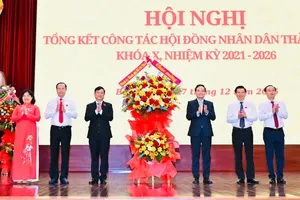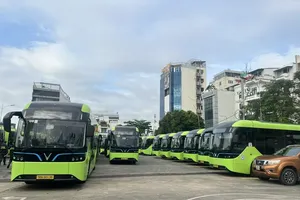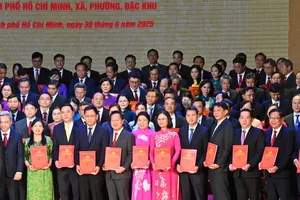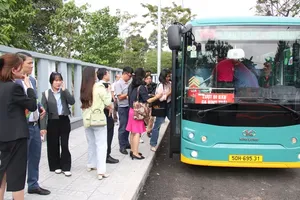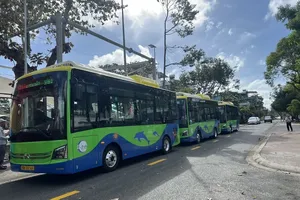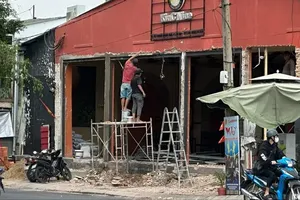
However, numerous delivery trucks only serve spontaneous trading points, densely clustering and obstructing the roads leading to the main markets, posing a threat to the existence of the wholesale markets and compromising food safety and hygiene during the Tet holiday.
Wholesale markets cry for help
In the early hours of January 26, a substantial volume of goods, including fruits, vegetables, and pork, gathered along Nguyen Thi Soc Street and a section of National Highway 22 in Hoc Mon District. This vibrant area is just a few steps away from the Hoc Mon wholesale market. According to data from the Hoc Mon wholesale market, around 170 spontaneous trading points have sprung up along these roads, directly impacting market purchasing power, pricing, and the income of traders.
Mr. Le Van Tien, Director of the Hoc Mon wholesale market, emphasizes, "Agricultural products continuously occupy the roadside 24/7, essentially forming an external wholesale market. During peak hours, from 8 p.m. the night before to 8 a.m. the next day, goods spill onto the roadway." In addition to avoiding taxes and fees like the traders in the official wholesale market, self-established businesses also dispose of waste onto the road, sidewalks, and areas surrounding the wholesale market. This waste amounts to 6-7 tons per day, causing environmental pollution and emitting foul odors in the vicinity.
Facing a similar situation, the spontaneous businesses around the Thu Duc wholesale market are bustling with buying and selling activities, illuminated by electric lights from late evening to early morning the next day. Mr. Nguyen Nhu, Deputy General Director of the Thu Duc wholesale market, noted that the total volume of goods entering the market has decreased by approximately 30 percent compared to the pre-Covid-19 period. This decline is partly attributed to the challenging economic conditions, reduced purchasing power, and the migration of business activities to spontaneous trading points. The owner of Co Loan fruit store at the Thu Duc wholesale market added that purchasing power is relatively weak, making it challenging to compete with the prices offered by spontaneous businesses outside the market, as they do not pay any taxes or fees.
The situation at Binh Dien wholesale market in District 8 is the same. Every night, the lively trading activities extend for kilometers along Quan Trong Linh and Nguyen Van Linh streets. In the quiet of the night, these stalls freely set up shop in the middle of the road. According to Mr. Phan Thanh Tan, Director of the Binh Dien Market Business Management Company, the unauthorized trading around the market is causing frustration and leading to complaints from traders.

When will there be a conclusive resolution?
It's worth mentioning that the nightly influx of goods to the three markets is exceptionally large, satisfying approximately 70 percent of the food needs for HCMC residents. Hence, ensuring effective management of food safety and hygiene for goods outside the wholesale markets is a pressing concern, especially tightening control over the sources of goods from spontaneous markets.
The Hoc Mon Wholesale Market Management Board confirms that the district People's Committee had previously established an interdisciplinary inspection team to promptly address self-established businesses. However, when the team withdrew, everything reverted to the previous state. "Information about the functional forces conducting inspections is always known to the spontaneous businesses. Is there a cover-up or complicity in wrongdoing?" Mr. Le Van My, General Director of Hoc Mon Trading Company cum Chairman of the Board of Directors of the Hoc Mon Wholesale Market Management and Business Company, said frustratingly. Similarly, the spontaneous market around Binh Dien wholesale market operates in the border area between Ward 7, District 8, and An Phu Tay Commune, Binh Chanh District, and the coordination for addressing this issue has not been effective.
Concerning solutions, Mr. Nguyen Nguyen Phuong, Deputy Director of the HCMC Department of Industry and Trade, stated that the city had issued directives and deployed forces multiple times. However, when the authorities were withdrawn, the situation reverted. Seeking fundamental solutions, the city is contemplating more modern and civilized business methods. For instance, there are plans to establish a modern pork trading floor. Pork from the three wholesale markets will be brought to the trading floor, meeting high-quality standards and providing a distinctive advantage for goods within the market compared to those outside. The Department of Industry and Trade has completed the plan, is seeking opinions from relevant departments, and aims to finalize it before the Lunar New Year.
In evaluating the surge of spontaneous markets surrounding wholesale markets, Ms. Pham Khanh Phong Lan, Director of the Food Safety Department, underscores the pivotal role of ensuring food safety at wholesale markets as the "cornerstone of the citywide food safety program." If the food's origin is not secured, subsequent measures such as kitchen and restaurant inspections become ineffective. The department allocates a significant workforce, maintaining a 24/7 presence at markets, particularly during peak late-evening hours. They conduct surprise inspections and regular checks at stalls. Confronted with goods spilling outside the market, the department is devising an indirect impact plan by ramping up inspections of product origins. For instance, during inspections of restaurants or collective kitchens, they will meticulously scrutinize the food's origin, demanding proof of purchase. Failure to provide proof will result in penalties.
According to Vice Chairman Nguyen Van Dung of the People's Committee in HCMC, the persistent emergence of spontaneous markets near wholesale markets and other traditional markets within the city is not a new issue but a complex challenge. Consequently, he urges the various departments, districts, and Thu Duc City to swiftly conduct a thorough review and implement decisive measures to cultivate a wholesome business environment for traders and guarantee food safety and hygiene for consumers, particularly during the upcoming Tet holiday.
